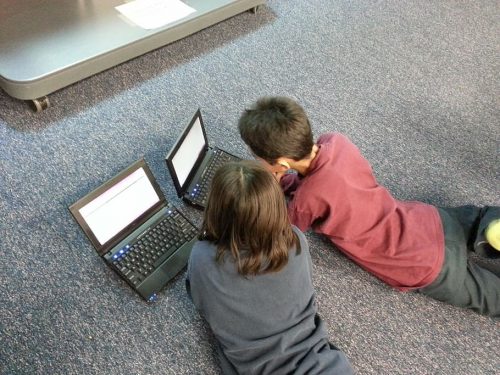Which font is your favorite? Consider the fonts you detest. Do you frequently experiment with fonts to achieve the ideal appearance and feel for a brand, piece of content, or digital product? Even though you might not give them much thought, this tiny little font significantly impacts learning and the sensation of mental stimulation in general. This article will discuss the importance of fonts for learning and retention.

Understanding The Significance Of Fonts
Further research says that your brain interprets the visual cues in a text as you read it in order to make sense of the information. It’s likely that you don’t focus much on the material’s presentation of the information because reading comprehension—rather than aesthetics—is your primary goal. But sometimes, the writing or content you see published is engaging enough—especially the font choice—that you can immerse yourself in it. Each font in a typeface has its own distinct qualities, like condensation, width, size, design, slant, italicization, and visual appeal, and each one is linked to a specific creator.
According to an expert from RMIT university, a crucial part of the visual appearance of educational materials is typography. Not only should content look attractive, but it should also be easier to read, help with information retention, and increase the involvement of learners. Typography is essentially the arrangement of type to provide the reader with a readable, readable and visually pleasing text. It entails choosing fonts (such as monotype corsiva, New Roman, comic sans, sans forgetica, and others), line lengths, point sizes, spacing between lines, and modifying the distances between collections of letters and pairings of words. Typography lecturer Stephen Banham often believes that these specifically designed fonts helped create desirable difficulty that allows individuals practice.
Despite the fact that most individuals (apart from design fanatics) ignore typography, it is essential to make texts intelligible, legible, and visually appealing to readers. Research indicates that fonts are important for the cognitive processes involved in reading a text and their visual impact. Although the effect of a font on your learning and retention of knowledge may not always be apparent, your brain is undoubtedly sensitive to it. That is the main goal of memory retention.
The ability to recall information over time is referred to as memory retention. Retrieval is the process of getting information back from certain brain regions after it has been encrypted and kept there. Your ability to retain information may occasionally deteriorate, and stored memory is lost with time. Thankfully, there are some factors that encourage the development of new brain cells and assist the cognitive system in creating new neural pathways. These may involve taking up a musical instrument, traveling, learning a new language, taking culinary or art classes, solving puzzles, engaging in board games, etc. However, writing and reading may be the most effective ways to improve memory retention in the near term.
A crucial part of learning involves memory retention, and over time, several methods and instruments have been developed to help with this. Effective study tools are still being researched in recent years, with options ranging from scribbling notes to taking information on digital platforms. It’s interesting to note that a component that may have gone unnoticed in this investigation—the fonts that individuals choose—has just come into the spotlight. This fresh viewpoint that results from the junction of typographic design and memory function can potentially improve educational opportunities and illustrates the importance of displaying font designs or styles in this way. It is created to emphasize a particular note, create a lasting impact, and enhance readability. These are intended to be utilized in some instance at predetermined sizes to draw attention to a certain message or improve legibility. Since individuals can better recall information they deem important, using styles of fonts like bold or italic to show relevance in a given text might boost retention.

Examining The “Size of Font”
An idea that has gained interest in memory research is the “font-size effect.” those exhibited in greater font sizes are thought to generate better perceptions of learning and represent higher worth, even if they may not actually boost memory compared to those in smaller fonts. This phenomenon is known as a “metamemory illusion.” Larger and bigger font texts are slightly better regarding learning and memory precision, although this was usually compared to smaller font texts.
While the benefit is relative, it is crucial to remember that increasing the font size throughout an entire document does not significantly improve memory recall. The concept of the font-size effect extends beyond the letterforms’ actual resizing. Instead, it refers to the notion that, in a written environment, a specific word or sentence holds a lot more weight than the other fonts.
Contrary to popular belief, fonts have more significance. Even though font selections might appear unimportant, they can greatly impact how engaged a reader is with written content, whether it’s a piece of writing or a branding idea. Font design also fulfills a functional need since it can influence people’s subconscious thoughts and how individuals perceive information.
Additionally, fonts are helpful as it allows readers enhance their reading comprehension and understanding, awareness, and general performance, aiding in memory retention and cerebral stimulation. Certain typefaces are made expressly to assist participants with dyslexia. This condition impacts the language processing regions of the brain and can lead to a person’s inability to distinguish between letters and numbers and their distortion of words.
Expected difficulty is created by hard-to-read fonts, making it challenging to interact with the content without distracting the reader. Rather than being a legibility problem, it can be a readability one. While both factors contribute to a text’s visual clarity, readability is the ease with which words and phrases may be understood, whereas legibility is the capacity to discern between individual characters or strokes. Consequently, because certain typefaces demand more mental effort than others, there is a cognitive weight that results in a need to increase performance. The complex letterform, which is just out of the ordinary enough to be noticed, is paired with a difficult-to-read font that was created especially to stimulate more complex thought processing and help with memory recall.
When evaluating a font’s efficacy, it is important to consider its internal consistency. This concerns how an independent variable like font size, text spacing, and form affects everything. It’s also critical to consider how readers view and interpret fonts that are visually appealing but difficult to comprehend and commit to memory. Important font-size characteristics like body size and length of lines are related to angles of vision and eye movement. Font design is essential to a person’s familiarity or unfamiliarity with a particular word. Hence, font attributes like style and color affect information retention or memory. Thus, these elements impact and further shape an individual’s reading ability.

Fonts Influence Engagement And Reflect Writers And Reader’s Attitude
You might not realize it, but when you compose or read a context, your attention is drawn to the illustration on the paper. Generally, you can quickly turn to the next page or look for another resource if the text, letter, or material is difficult to read. This is because you eventually feel a bit uneasy putting your gaze into congested letters (not emphasizing those intricate typefaces that you inadvertently find difficult to read).
Upon closer inspection, fonts play a significant role as they promote a website or text passage with personality. Their subliminal elicitation of emotions influences your perception of the content. For this reason, you characterize it as either cluttered, disorganized, or out-of-date or as trendy, crisp, sophisticated, and clean. Given the abundance of typefaces available, it stands to reason that the choice of font can influence how readers or learners initially perceive the information being presented. In other words, students are more likely to interact with material when it appears in a font style they find appealing, readable, and soothing.
While it also offers a great deal of design creativity and readability, the fact that online learning is essentially the primary source of education for the majority of individuals in the current world puts a lot of pressure on designers. Legibility is the degree to which one can easily tell a word from another in a given font. Legibility is influenced by font dimension, form, and variation. Legibility is vital to a user’s ability to read and engage with material on a website. However, creating a paper that people will read is one of the biggest writing obstacles. The intended audience may not feel compelled to read your work, particularly if it is more difficult to understand or placed in an unsuitable writing style.
There are practical uses for understanding how fonts affect your brain functions. You need to learn and understand safety information more quickly because you are likely exposed to various phrases and styles at your job, school, or home, and you read hundreds of messages daily. Font research may also assist individuals in remembering safety precautions, medical information, or even simple details like the birthdays of loved ones. Due to its simplicity, clarity, and ease of use, Arial is a sans-serif typeface that most users prefer. And these are the only answers and attributes that are suggested in writing.
Final Thoughts
Researchers said that these kinds of typefaces are a lot more than just fonts in general. They act as instruments to aid in reading speed, obtaining data, and memory retention. They also help a team of people with vision or reading impairments have easier access to information. Even while such assistive devices can enhance reading ability, there is still much to learn about how people read, comprehend, overlooked and retain information, even when they only use the fonts that they find comfortable and appealing.
Frequently Asked Questions
What Font Is Best For Memory Retention?
Which Font Is Best For Learning?
How Fonts Affect Learning And Memory?
What font is associated with education?
What is the font for easy memorization?
What is the best font color for memorization?
What is the best font for learning difficulties?
Does font affect learning?
Does writing improve memory retention?
Do fonts affect memory?
Does font affect reading comprehension?
Does font color affect memory?
Is it better to read small or big font?
What font style is more appropriate for longer text?
Why readable fonts are important?






























